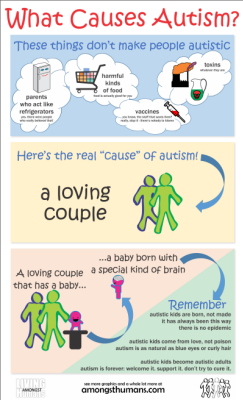Reasons
What causes ASD?
The exact cause of ASD is not known.
While both genetics and environment likely play a role, its exact cause remains unknown.
There is a lot of research being done worldwide to understand how genes and exposure to things in the environment can increase the risk that a child will have ASD. However it's important to keep in mind that increased risk is not the same as cause. For example, some gene changes associated with ASD can also be found in people who don't have the disorder.

ASD is not:
- contagious
- caused by vaccination
- caused by parenting style
What Environmental Factors May Be Associated With Autism?
Progress has been made toward understanding different environmental contributors, and the clearest evidence involves events before and during birth, such as:
- Advanced parental age at time of conception
- Prenatal exposure to air pollution or certain pesticides
- Maternal obesity, diabetes, or immune system disorders
- Extreme prematurity or very low birth weight
- Any birth difficulty leading to periods of oxygen deprivation to the baby’s brain
But these factors alone are unlikely to cause autism. Rather, they appear to increase a child’s likelihood for developing autism when combined with genetic factors.
Air pollution – Researchers found early-life exposure to air pollution may be a risk factor for autism.
- Children of mothers living near a freeway, and traffic-related pollution, during the third trimester of pregnancy were twice as likely to develop ASD. A distance of 1,014 feet, or a little less than 3.5 football fields, was considered near a freeway.
- Children with a mutation in a gene called MET, combined with high levels of exposure to air pollution, may have increased risk.
Prenatal conditions and maternal factors – Problems with a mother’s immune system, certain metabolic conditions, or inflammation during pregnancy may be linked with higher rates of autism diagnosis for her children.
- Some mothers of autistic children have antibodies, or proteins in the body that fight infection, that may interfere with their children’s brain development, possibly leading to autism.
- Maternal diabetes or obesity are linked to increased likelihood of having a child with autism or other developmental disability.
- Fever during pregnancy was associated with increased autism in offspring.
Metals, pesticides, and other contaminants – Prenatal and early childhood exposure to heavy metals, like mercury, lead, or arsenic; altered levels of essential metals like zinc or manganese; pesticides; and other contaminants cause concern.
- For people in the Republic of Seychelles, fish consumption is high and a primary way they are exposed to mercury. But a study there found no association between this type of prenatal, dietary mercury exposure and autism.
- Researchers found that after adjusting for dietary and other mercury sources, children with autism had similar mercury levels in blood as those without.
- A study of twins used baby teeth to determine and compare levels of lead, manganese, and zinc in children with autism to their twin without the condition. Autistic children had lower levels of essential metals, manganese and zinc, but had higher levels of lead, a harmful metal during specific developmental time periods studied.
- Researchers further found that zinc-copper cycles, which regulate metal metabolism in the body, are disrupted in ASD cases compared to their twins not diagnosed with ASD.
- Maternal exposure to the insecticide DDT during early pregnancy was associated with higher risk of autism in their children.
- Researchers are also studying contaminants such as Bisphenol A, phthalates, flame retardants, and polychlorinated biphenyls to see if they affect early brain development and possibly play a role in autism.
Nutrition – NIEHS-funded studies have found taking prenatal vitamins may help lower autism likelihood of autism diagnosis. Furthermore, research suggests taking vitamins and supplements might provide protective effects for those exposed to certain environmental contaminants during pregnancy.
- Women were less likely to have a child with autism if they took a daily prenatal vitamin during the three months before and first month of pregnancy, compared to women not taking vitamins. This finding was more evident in women and children with genetic variants that made them more susceptible to developing autism.
- Folic acid is a source of the protective effects of prenatal vitamins. Women who took the daily recommended dosage during the first month of pregnancy had a reduced likelihood of having a child with autism.
- Pregnant mothers who used multivitamins, with or without additional iron or folic acid, were less likely to have a child with autism and intellectual disability.
- Folic acid intake during early pregnancy may reduce the impact on autism diagnosis of high exposure to air pollution, and pesticides during pregnancy.
- Maternal prenatal vitamin intake during the first month of pregnancy may also reduce ASD recurrence in siblings of children with ASD